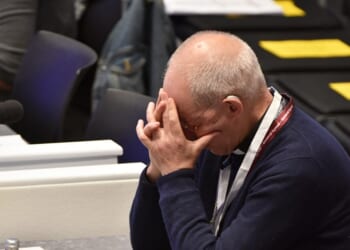DOES anti-Semitism differ in changing historical periods — or is it always essentially the same? That was just one of the questions that I carried away from the final performance of Mark Rosenblatt’s extraordinary play Giant, on which the final curtain came down last Saturday (Arts, 11 October 2024).
The play is a multilayered and sophisticated exploration of the anti-Semitism of Roald Dahl. Besides writing weird and wonderful stories for children, and disturbing short stories for adults, in 1983 he reviewed a book, God Cried, about Israel’s 1982 invasion of Lebanon, in which thousands of Palestinians were massacred in their refugee camps.
But Dahl did more than condemn Israel’s hawkish government. He wrote: “Never . . . has a race of people switched so rapidly from being much pitied victims to barbarous murderers,” casting collective blame for the war on all Jews. Then he told a magazine interviewer: “Even a stinker like Hitler didn’t just pick on them for no reason.”
Dahl — a fiendishly charismatic, charming, and yet sadistically cruel man — clearly crossed the line between legitimate criticism of the government of Israel and overt anti-Semitism. But several characters in the play invite different inferences about where that line is to be found. The audience, of course, thought of Gaza today. The playwright said that he had become alarmed “by how openly anti-Semitic language and stereotyping was blurring with meaningful, constructive debate around Israel and Palestine”. But he was not referring to today: he began writing the play in 2018.
That’s a third historical period. In 2018, Palestinians held protests in Gaza demanding a “right of return” to their homelands in Israel. The Israelis shot 180 of them through the fence. Donald Trump moved the US embassy to Jerusalem, and the Knesset declared Israel the nation-state of the Jewish people, downgrading the status of Arabic. Hamas fired rockets into Israel. Benjamin Netanyahu responded with air strikes and tank fire. I do not recall that that resulted in an increase in anti-Semitism in the UK. But Mark Rosenblatt, a British Jew, clearly did.
It was around this time that the International Holocaust Remembrance Alliance declared that holding the Jewish people responsible for the actions of Israel constituted anti-Semitism. Human-rights groups condemned it as an attempt to curb criticism of Netanyahu’s policies.
That is a debate for another day. But what is interesting is that various bodies within the Jewish community are now openly rejecting the conflation of the values of Judaism with those of the Netanyahu regime. Some 400 rabbis around the world have called on Israel to cease its “callous indifference to starvation”. An Israeli human-rights organisation has condemned extremist settler attacks on Palestinian families in the West Bank as a pogrom — a term historically used to describe purges of Jews.
In the UK, the Board of Deputies has declared that “food must not be used as a weapon of war”, and called for “a rapid, uninhibited and sustained increase” in food aid. To make the people of Gaza suffer for the crimes of Hamas is “in complete contradiction to Jewish values”. Extremist settlers are “a stain on the Zionist project”.
When Jews speak up like that, the line between anti-Semitism and criticism of the policies of the Netanyahu government could not be clearer.















